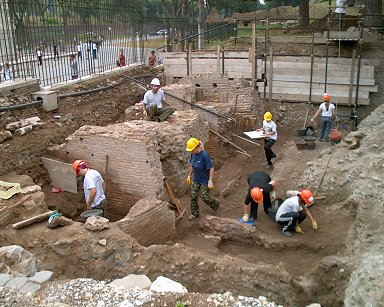There are many types of perfectly acceptable foundations including pier and beam, slab, crawlspace and full basement. They can be built of stone, brick, poured concrete, concrete block, insulated concrete or wood. But one type of foundation is a real turn-off for buyers: one they have to think twice about. No one wants to live in a home that is not built upon a solid foundation.

Foundation problems arise for many reasons, with varying degrees of severity. The soil upon which the foundation was built may be weak, causing settlement. Cracks appear, floors slope, windows and doors won’t close properly, and chimneys tilt as a result of the settlement. On occasion, saturated soil may expand and exert lateral pressure against foundation walls, causing foundation to tilt, bow or bulge. Prolonged periods of drought may also cause problems. Soil can shrink and pull away from the foundation, causing settlement and cracks. In some regions underground erosion, such as sinkholes, may undermine foundations as well.
Regardless of the cause, foundation problems will generally reduce the value of a home. How much depends upon the severity of the problem. Repairs can range from a couple thousand dollars, to north of $100,000. Foundation cracks due to the initial settlement of a home soon after it was constructed are considered minor, especially if there has been no further movement during succeeding years. Foundations that are still moving years later are another matter.
Is buying a home with a bad foundation worth the risk?
A home’s value depends upon many variables when selling or buying a home. Foundation condition is a major one, but may be overridden by location, amenities and the uniqueness of the property. Gail Robinson, Realtor at William Raveis Real Estate in Southport, Connecticut, says that foundation problems are not deal breakers for the right buyer. “Everything is fixable, it just depends how much the repair will cost and how much inconvenience the repair will cause.”
That said, however, she believes that only the savvy should consider a foundation-challenged home. “If the buyer is sophisticated and doesn’t mind going beyond cosmetic improvements, a home with a foundation problem may present an opportunity. I would definitely begin by getting estimates for the needed repairs,” says Robinson. “Investors and buyers willing to renovate are much more focused on the structural integrity of the home, mechanics, and other basic issues than the majority of buyers,” she adds.
On the other hand, if Robinson is working with the typical buyer – one who wants a home in move-in condition – she steers them away from any home with a serious foundation problem. Most homeowners underestimate the impact and disruption of structural repairs, she says. “Many buyers seem more concerned about the inconvenience of renovating a bathroom or kitchen, than structural repairs.” This may be due to the buyer’s lack of knowledge or to their tendency to focus on home design and décor. “As real estate agents, we have a duty to point out the basic structural and mechanical issues that our clients may overlook in their excitement over the charm of the home, the location, the updated kitchens and baths, and other amenities,” says Robinson.
Buying a home with a foundation problem
The best thing a buyer can do is to get professional help with identifying the problem. To do so, it may be necessary to hire a structural/geo-technical engineer to analyze the foundation’s condition. While home inspectors can recognize the problem, they are generally not qualified to give you a full assessment of its causes. Foundation Supportworks, a national network of foundation repair dealers, has access to its own engineers or can hire outside engineers as necessary, says Steven Lintzner, Northeast Regional Manager at Foundation Supportworks. Once you have the engineer’s report, get estimates from contractors who specialize in foundation repair. “We come out, do the inspection, and provide a very detailed list of what we’ll do,” says Lintzner. “Buyers can then use our estimate in negotiations with the seller.” “Rarely,” he says, “do our estimates differ from the actual costs, but if there is a question we’ll flag it so the buyer can factor in the unexpected.”
With estimates in hand, you will be in a better position to negotiate a fair price. “Ideally money should be kept in escrow from the sale to cover the cost of the foundation repair, if one is needed,” says Robinson. “If the seller can’t afford to do this, then the buyer should figure out the worst case scenario and factor that into the sale price,” she adds.
Once a contract is drawn up, it’s a good idea to have an engineer certify the repair plan and to inspect the job during and after its completion. Some municipalities require a report by a licensed engineer before a permit can be pulled. Only consider experienced companies that offer warranties for their work.
If you own a home with a foundation problem
If your foundation has a problem, regardless whether you have plans to sell your home, it’s wise to consider making the repair sooner rather than later. You’ll be able to negotiate with contractors without the pressure of having to make the repairs quickly and scheduling of the work can be done at your convenience. More importantly, you’ll avoid complications with buyers and their lenders down the road. Homes with structural problems do not appraise well, and homes that don’t appraise well are difficult to finance.
By making foundation repairs now, you’ll also be able to enjoy your home during the years you live in it. Without addressing the problem, you’ll be unlikely to invest in improvements that can improve your quality of life. For example, it would not make sense to finish your basement until your foundation problem is solved. Installing new windows would be a questionable investment without stopping foundation movement first. Even adding a deck, patio, or walkway could be affected by future foundation work.
The bottom line is that it makes little sense to live with foundation problems. Sooner or later you will have to pay for the repairs. By doing the work sooner, it’s likely to be a lot less expensive than waiting until you must sell your home.
Written By: Joe Provey is a home improvement and green living writer who has authored several books, including Convert Your Home to Solar Energy.
Christine is the Content Marketing Coordinator for Homes.com. She's a small town girl at heart, who currently lives in Norfolk, VA with her husband and their fur baby. When she's not working, she enjoys cooking, decorating, traveling, and binge watching Netflix. As a proud Virginia Tech alum, she also loves cheering on the Hokies!

















